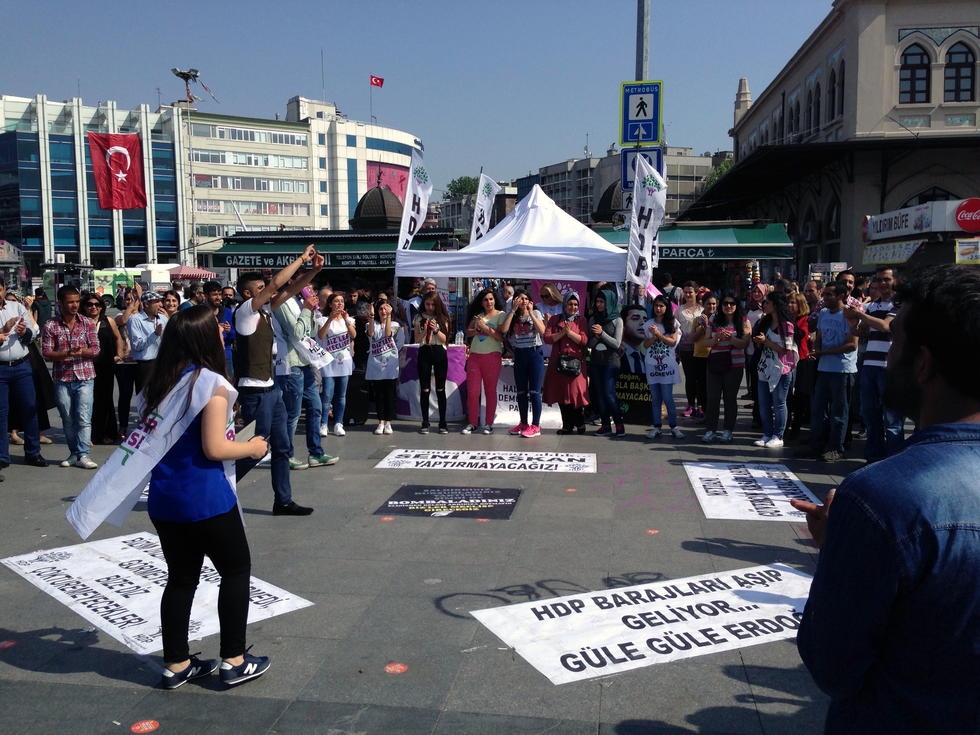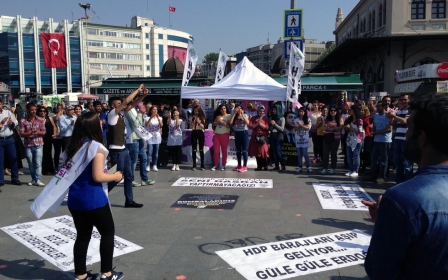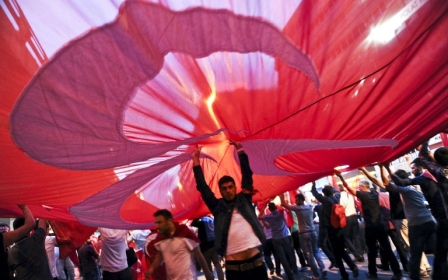ANALYSIS: Waves of change in Turkey?

The ruling Justice and Development Party (AKP), which has won every single election - presidential, legislative, and municipal - without serious opposition since first coming to power in 2002, may not score the same success for the 7 June general elections this year.
Although it is difficult to pinpoint the exact reasons behind AKP’s success for more than a decade, its victory in the ballot boxes has been mainly attributed to economic development and investment in infrastructure and social services.
Over the years, AKP’s traditional constituency has included conservative Turks, non-secular nationalists, Kurds and even liberals, but polls show that some groups within this constituency are expected to defect and turn toward the ruling party’s opponents instead.
Apart from a slowdown in the economy, one of the main reasons behind a possible decrease in AKP support is the precarious peace process initiated by President Recep Tayip Erdogan in 2013 aimed at ending decades-old insurgencies responsible for claiming the lives of some 40,000 people.
For two years, the AKP was at the forefront of a negotiated ceasefire and the possibility of unprecedented Kurdish inclusion in a Turkish state that would recognise the minority’s cultural and linguistic rights.
But since the Kobani protests that led to the death of 34 people in eastern provinces in October last year, many Kurds feel alienated and have less faith in negotiations between the Kurdistan Workers’ Party (PKK) and AKP.
Furthermore, a smear campaign led by the pro-Kurdish Peoples’ Democratic Party (HDP) alleging that the AKP supported the Islamic State (IS) against the Rojava Kurds has caused many Kurds to turn their backs on AKP, according to Turkish journalist and commentator Ceren Kenar.
It is not the Kurds alone who are likely to move away from the AKP because of the peace process, however. Polls expect the right-wing Nationalist Movement Party (MHP) to gain seats in parliament, which analysts say may be due to dissident nationalist AKP voters trying to curb the progress of the Kurdish peace process.
“The irony in this election is that because of the peace process, AKP could lose votes among the Kurds to the HDP, but also among the nationalists to the right-wing MHP,” said Kenar.
The pro-Kurdish HDP, which hopes to surmount a 10 percent threshold in order to be represented in the 550-seat parliament, is likely to go beyond its Kurdish constituency and garner the support of several other groups in Turkey.
The HDP may gain the support of previously antagonistic groups towards the Kurdish question, and analysts now perceive the HDP as the last saviour against Turkey becoming a presidential system. If HDP passes the 10 percent threshold, Erdogan’s ambitions for passing a referendum on the constitution may lie in tatters.
“All of a sudden, Kurdish demands became plausible for the opposition. Kemalists and Gulenists who accused AKP of selling out Turkey to the Kurds two years ago are now voting for the Kurdish party,” said Kenar.
While the Kemalists have always been ardent opponents of the AKP, the Gulenists only turned against AKP in 2013 when an open political battle between the former allies broke a decade-long AKP-Gulenist alliance.
Therefore, secular Republican People’s Party (CHP) supporters may vote tactically to stop Erdogan from moving the country to a presidential system.
“Staunch Kemalists are issuing fatwas declaring that it is permissible to vote for HDP just this time, because it is the only force that can stop Erdogan,” explained Kenar.
At the same time, HDP may attract affluent liberals and activists who in 2013 became increasingly antagonised by the government after it cracked down on Gezi Park protesters.
According to Aaron Stein, an associate fellow at the London-based think tank RUSI: “HDP is polling from the affluent liberal Turks and Alevis, who although have traditionally voted for CHP, are attracted to the HDP’s liberal messages, on women’s rights for example.”
Therefore, while the opposition groups of the nationalist MHP and pro-Kurdish HDP have a chance at expanding their voter bases, the number of seats allocated to the secular CHP are likely to remain flat if not decrease, analysts have said.
“CHP is a regional, not national party. It has fundamentally failed to expand its voter base outside its traditional strongholds,” said Stein, referring to Turkey’s western provinces.
“Although CHP have run a smart campaign that has very effectively targeted AKP’s economic policy particularly the economic inequality and the corruption allegations, its campaigns have allowed smaller parties such as the HDP to rise instead,” he added.
Yet polls in Turkey are notorious for their inaccuracy and the ruling party may still surprise everyone with yet another sweeping victory.
“Turkish voters are volatile; we may see huge numbers turning to AKP during the last few days ahead of the vote,” said Kenar.
Furthermore, on top of AKP’s ubiquitous election campaign, the party used a fear tactic to garner even more supporters by warning Turks against a possible coalition government.
“AKP is telling voters there is a possibility for a coalition government and that more of their supporters need to vote,” said Kenar, referring to Turks’ traumatic memory of the 1997 coalition governments.
Turks fear that a coalition government could bring back a severe economic crisis that peaked under Tansu Ciler’s leadership during the four years that preceded AKP’s coming to power in 2002.
“It is likely that AKP can mobilise its base even further during the final days ahead of the poll," added Kenar.
New MEE newsletter: Jerusalem Dispatch
Sign up to get the latest insights and analysis on Israel-Palestine, alongside Turkey Unpacked and other MEE newsletters
Middle East Eye delivers independent and unrivalled coverage and analysis of the Middle East, North Africa and beyond. To learn more about republishing this content and the associated fees, please fill out this form. More about MEE can be found here.




